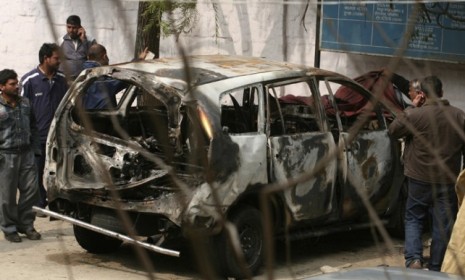Coordinated attacks on Israeli diplomats: Payback from Iran?
Bitter tensions between Israel and Iran grow worse as the feuding nations trade accusations over bombing attempts on Israelis in India and Georgia

A free daily email with the biggest news stories of the day – and the best features from TheWeek.com
You are now subscribed
Your newsletter sign-up was successful
After Israel blamed Iran for Monday's coordinated attacks on Israeli diplomatic missions in India and Georgia, leaders in Tehran responded with accusations of their own, saying that Israel had planted the explosives itself to "tarnish Iran's friendly ties with the host countries." The dueling allegations come after weeks of rising tensions between the two nations. Where is the Iran-Israel feud headed now? Here, a brief guide:
How much damage did the attacks to?
Things could have been far worse. In Tblisi, embassy workers spotted a black plastic bag hanging from the bottom of a diplomatic vehicle, and experts managed to defuse a grenade inside before it could detonate. A charge attached to the side of an embassy car in New Delhi did explode, however, injuring the wife of an Israeli diplomat, her driver, and two people in another vehicle.
The Week
Escape your echo chamber. Get the facts behind the news, plus analysis from multiple perspectives.

Sign up for The Week's Free Newsletters
From our morning news briefing to a weekly Good News Newsletter, get the best of The Week delivered directly to your inbox.
From our morning news briefing to a weekly Good News Newsletter, get the best of The Week delivered directly to your inbox.
What makes Israel so sure this was Iran's handiwork?
The attacks were "virtually identical" to one that killed an Iranian nuclear scientist last month, with motorcyclists speeding up and attaching charges to the vehicles. The January assassination in Iran was the fifth such strike in two years. Iran has blamed those attacks on Israel, and the use of similar methods suggested the strikes in Georgia and India were meant as "payback," says Richard Esposito at ABC News. So did the timing: The bombs appeared the day after the fourth anniversary of the assassination of Imad Mughniyah, a top leader of Iranian-backed Hezbollah.
Is the feud expected to escalate?
Some Middle East experts believe this is just part of the steady slide toward a possible military confrontation. Iran has lost four nuclear scientists since 2010, and Israeli security officials expect Iran to retaliate for Israel's alleged involvement. Meantime, Israel has been ramping up its threats to attack Iran's nuclear facilities unless it gives up its controversial nuclear problem, which Iran insists is peaceful but the West believes is aimed at acquiring nuclear weapons.
A free daily email with the biggest news stories of the day – and the best features from TheWeek.com
Does this increase the chance of war?
The showdown certainly has focused the world's attention on Iran. It remains unclear whether Israel's saber rattling is "a bluff designed to spur tougher economic sanctions," says Edmund Sanders at the Los Angeles Times, "or a means of preparing the world, politically and psychologically, for what some see as an inevitable confrontation, perhaps as soon as this summer." If the India bombing and the attempt in Tblisi really were executed by Iran, says Jennifer Rubin at The Washington Post, it would prove that President Obama's strategy of isolating Iran is not working. "If this is Iran now, imagine Iran with the bomb."
Sources: ABC News, Haaretz, LA Times, TIME, Wash. Post
-
 The Olympic timekeepers keeping the Games on track
The Olympic timekeepers keeping the Games on trackUnder the Radar Swiss watchmaking giant Omega has been at the finish line of every Olympic Games for nearly 100 years
-
 Will increasing tensions with Iran boil over into war?
Will increasing tensions with Iran boil over into war?Today’s Big Question President Donald Trump has recently been threatening the country
-
 Corruption: The spy sheikh and the president
Corruption: The spy sheikh and the presidentFeature Trump is at the center of another scandal